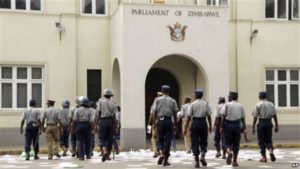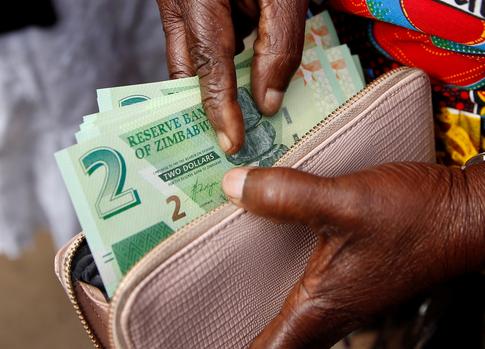A resolution at the recent SADC Summit chose October 25 as the day for regional governments to articulate and mobilise support for the sanctions imposed two decades ago on Zimbabwe to be lifted.
SADC has claimed that sanctions against Zimbabwe have ultimately been damaging to the region’s economy. The direct link between sanctions and Zimbabwe’s economic crisis has not, however, been made.
October 20 was declared a national holiday in Zimbabwe to encourage citizens to protest against the continued imposition of sanctions, although only 3000 turned out at the national march and the stadium was not even half full.
While the lifting of sanctions would certainly provide economic relief to targeted individuals and entities, they certainly will not serve as a panacea to Zimbabwe’s economic crisis.
Zimbabwean President Emmerson Mnangagwa’s claim that “sanctions are slowing down our progress, inhibiting our economic recovery and punishing the most vulnerable”, is not borne out by expert research.
Neither is the assertion of the government of Zimbabwe that sanctions have caused untold misery to ordinary Zimbabweans.
Sanctions seem to be used by politicians as a scapegoat for Zimbabwe’s economic decline that is largely the result of years of economic mismanagement, pilfering of state resources, endemic corruption, entrenched state capture, and poor governance.
The fact that basic services are not available to many Zimbabweans, and the cost of essential goods and staple food items are beyond the reach of millions, cannot be blamed primarily on targeted sanctions.
Political instability has also been a factor in Zimbabwe’s poor economic performance.
As Minister for International Relations Naledi Pandor said in her opening remarks at a symposium on Zimbabwe in Pretoria this week: “The political dynamics are inextricably linked to the economic and thus should be confronted simultaneously.”
Pandor also acknowledged an inescapable truth about discussions on the situation in Zimbabwe: “We have all become very competent at addressing and adopting resolutions, yet far too inadequate in informed reflection on what solutions or approaches may be practicable.”
A good starting point is to understand exactly what sanctions have been imposed on Zimbabwe, what economic effect they have had, and whether they remain relevant after two decades.
The newly arrived US Ambassador to South Africa, Lanna Marks, told the press on her first official day in the job last week that the only sanctions being maintained by the US on Zimbabwe were against Grace Mugabe, as well as an arms embargo.
But the US is still maintaining targeted sanctions on 83 individuals who face financial and travel restrictions.
There is some confusion around the exact figures as some individuals are listed a number of times under different aliases, such as Chinese businessman Sam Pa.
The US list of specially designated individuals on the Zimbabwe sanctions list is particularly problematic as it has little relevance 20 years on, and has not been updated. Some of those listed are now deceased, and others no longer have political relevance.
New names have been added, however. For example, after the October 20 march against sanctions, the US slapped sanctions on Zimbabwe’s State Security Minister Owen Ncube for alleged gross human rights violations, such as the torture of civil society activists, and the recent spate of abductions.
The US is maintaining sanctions against 53 large companies and organisations, which can specifically be broken down into 21 farm enterprises and 32 other business entities.
Of the 32 entities listed, 17 are linked to businessman John Bredenkamp as a result of his alleged involvement in mining deals in the DRC and arms dealing. Some of those are also on the list for having been implicated in the exploitation of the Marange diamonds.
Two Zanu-PF party companies are on the list.
In addition to the US targeted sanctions, the US has imposed a ban on arms exports to Zimbabwe.
As for the EU, it imposed sanctions on Zimbabwe in 2002 due to the escalation of violence and intimidation of political opponents and the harassment of the independent press.
The sanctions comprised an arms embargo as well as an asset freeze and travel ban on targeted individuals and entities.
In 2008 there were 200 individuals and 40 entities on the list, but by 2016 only then-president Robert Mugabe and his wife remained on the list, as well as Zimbabwe Defence Industries.
The list of targeted individuals has since been updated and currently only former first lady Grace Mugabe remains on the list. While the Commanders of the Defence Force are on the updated list, they have been suspended. There remains a ban on the export of military equipment to Zimbabwe as well as technical military assistance.
As far as the effect of EU sanctions goes, it can hardly be argued that an asset freeze and travel ban directed at Grace Mugabe, and a ban on exporting military equipment to Zimbabwe have caused “untold misery to ordinary Zimbabweans”.
US sanctions against Zimbabwe, which are more comprehensive and also outdated, have had greater indirect economic ramifications for the country. The reason being that as a result of US sanctions, companies find it difficult to move US dollars into Zimbabwe as banks can be fined for dealing with sanctioned countries.
Just as companies have shied away from investing in other countries under US sanctions (Iran, for example), it is also true that companies have shied away from investing in Zimbabwe.
The state of the Zimbabwean economy with runaway inflation at 97.9% in June, and other factors such as entrenched corruption, political instability, poor governance and weak export competitiveness are real impediments to Zimbabwe becoming an attractive investment destination.
It is also important to note that it is not as a result of sanctions that Zimbabwe has failed to access lines of credit from international financial institutions.
This is because the international financial institutions (IFI) require Zimbabwe to repay prior loans before accessing further funding. Zimbabwe is indebted to all IFIs except for the International Monetary Fund (IMF), which is why it has not been eligible for loans in the past two decades.
In 2016 Zimbabwe cleared its debt to the IMF, although it still has an outstanding debt of US$2.3billion (R33.8bn) to the World Bank, US$680m to the African Development Bank, and US$308m to the European Investment Bank.
While it is true that the lifting of US sanctions may assist Zimbabwe in attracting some forms of investment, and may make it easier for companies to transfer US dollars to Zimbabwe, it will not serve as the solution to Zimbabwe’s massive economic challenges or lead to the recovery of the agriculture, health and education sectors.
What Zimbabwe most needs at this juncture to improve its economic outlook is political stability and transparency, an end to the impunity of the security forces for human rights abuses, measures to stamp out corruption at all levels, consistent economic policies, a cash injection of hard currency into the economy, restructured debt with the IFIs, and ultimately debt relief.
It is a catch-22 situation, however, as the US is likely to vote against any new lines of credit or debt relief from the IFI’s for Zimbabwe unless reforms are undertaken.
* Shannon Ebrahim is Independent Media’s foreign editor.




 Jordan Rothman is a partner of
Jordan Rothman is a partner of 







 A resolution at the recent SADC Summit chose October 25 as the day for regional governments to articulate and mobilise support for the sanctions imposed two decades ago on Zimbabwe to be lifted.
A resolution at the recent SADC Summit chose October 25 as the day for regional governments to articulate and mobilise support for the sanctions imposed two decades ago on Zimbabwe to be lifted.


